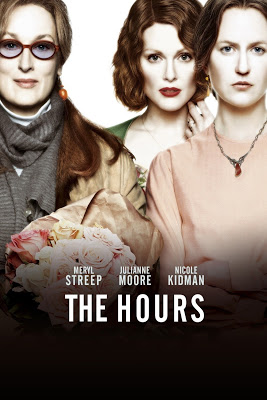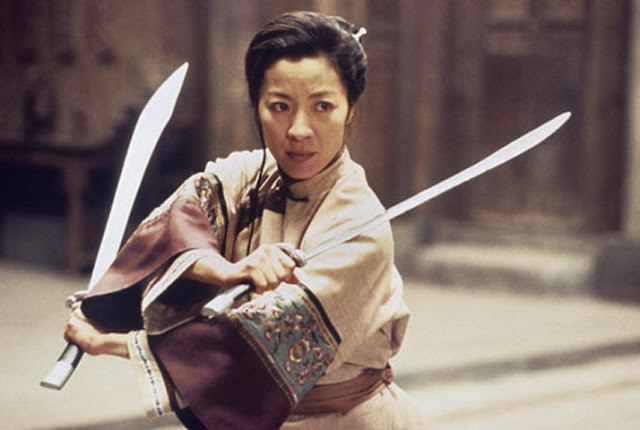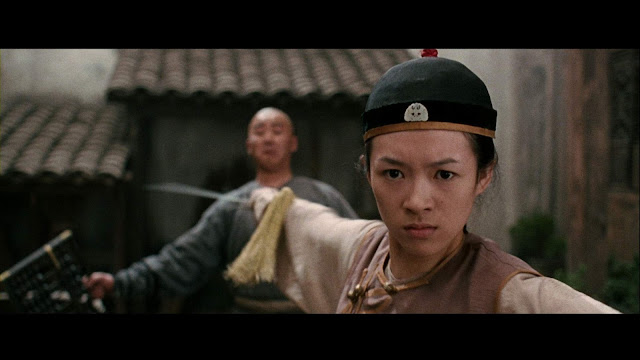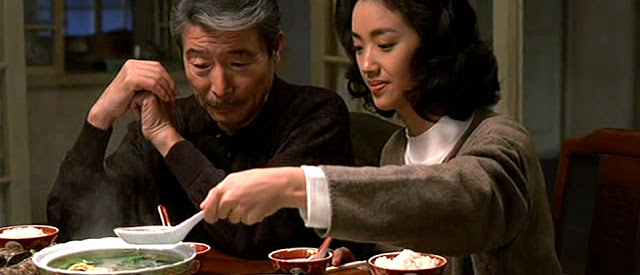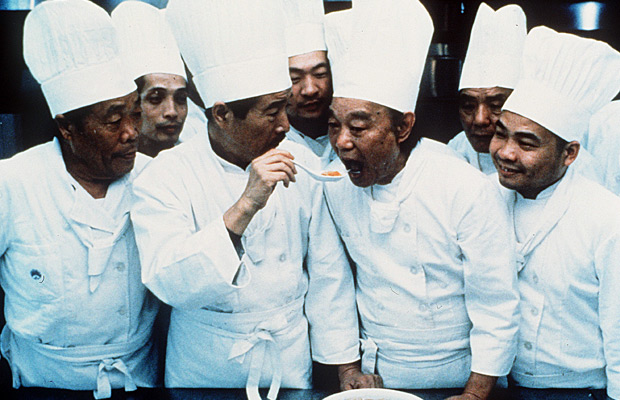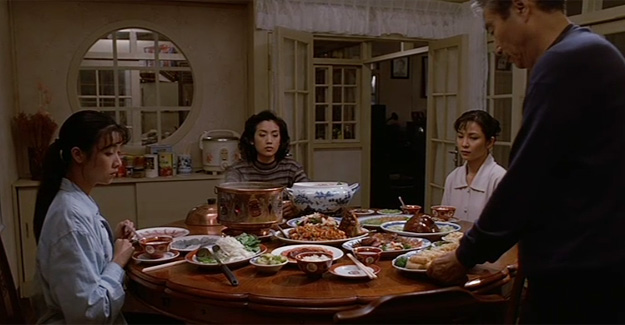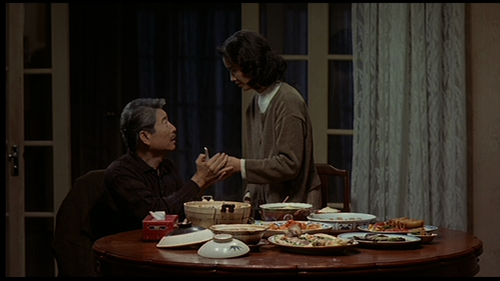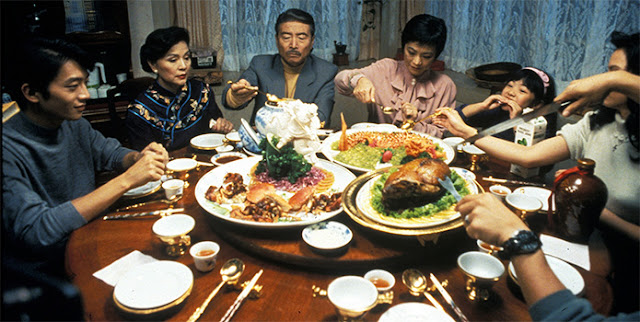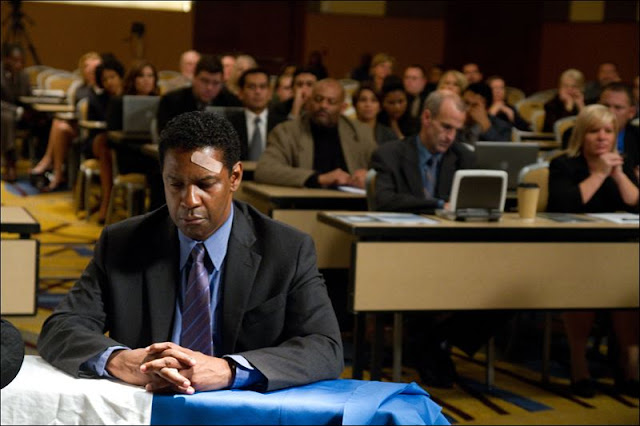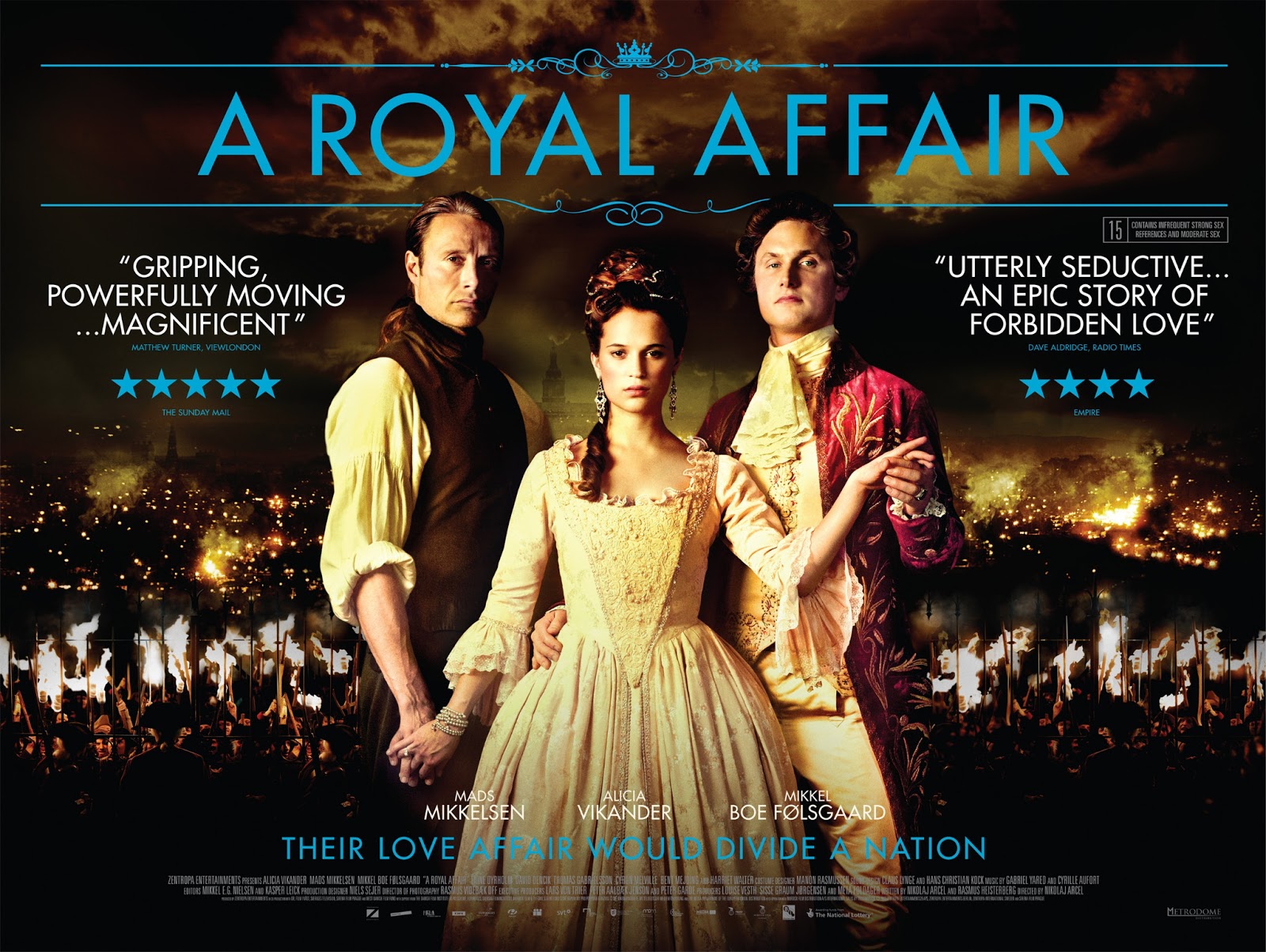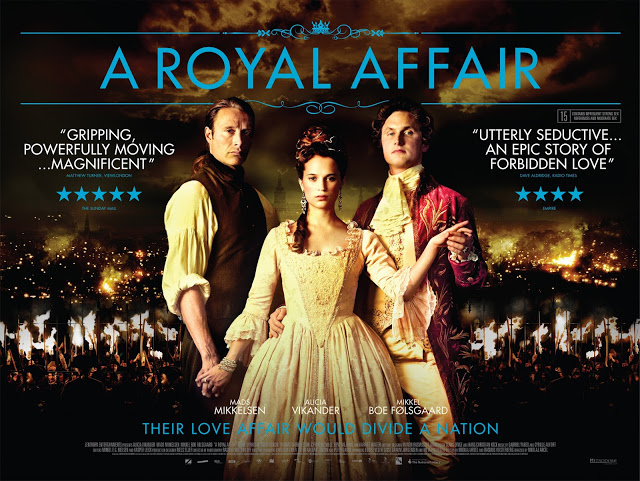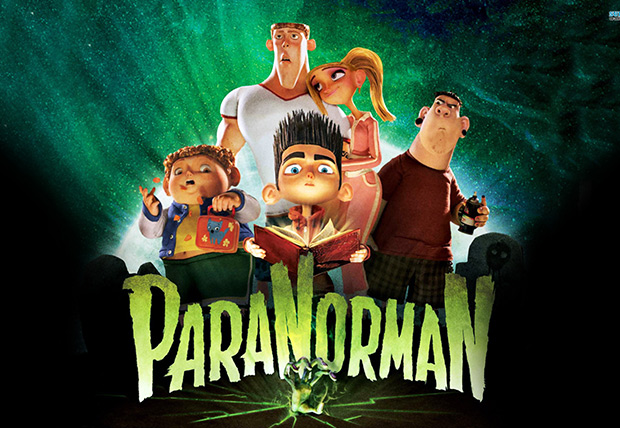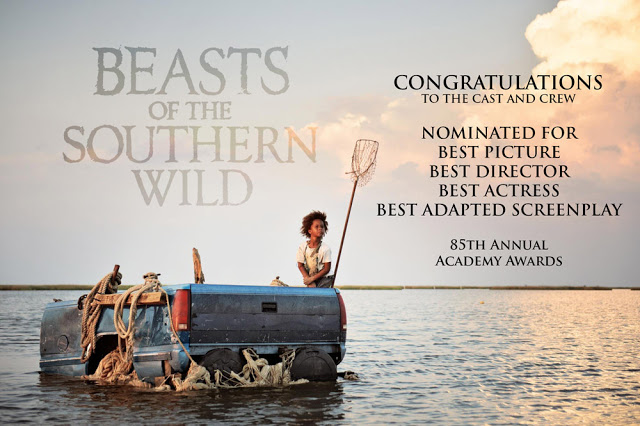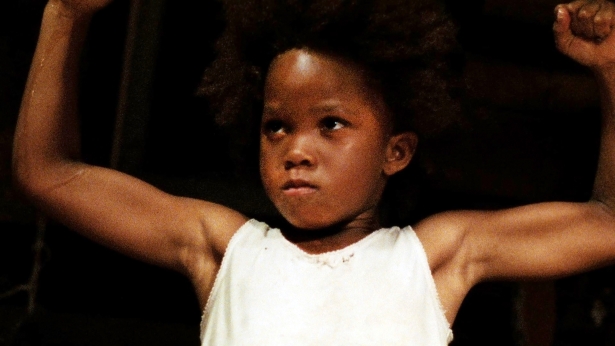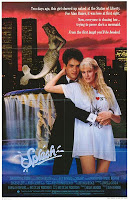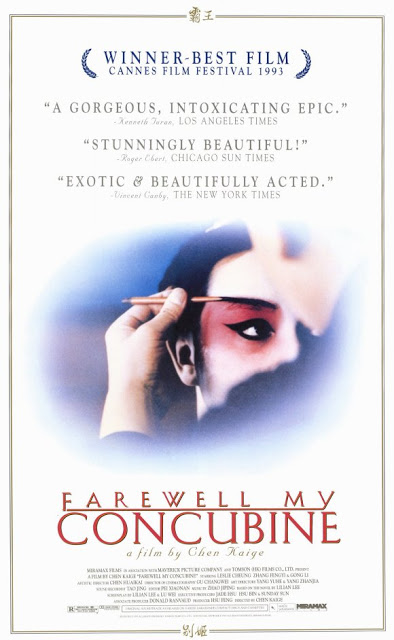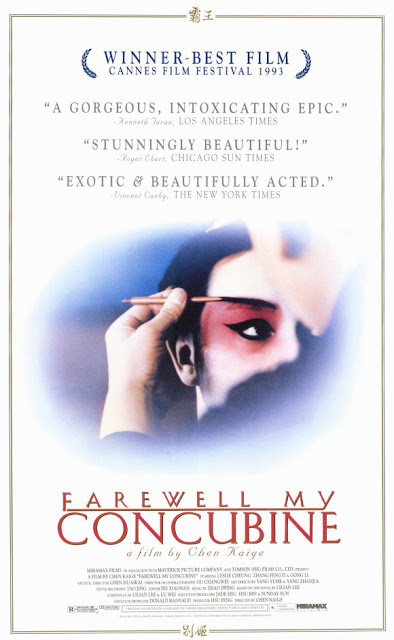 |
| Movie poster for The Hours |
 |
| Nicole Kidman as Virginia Woolf in The Hours |
Virginia even has an incestuous, lesbian relationship with her sister Vanessa (Nessie).
 |
| Virginia Woolf and her sister Nessie |
At the end of her sister’s visit, Virginia and Nessie kiss passionately, and it is clear that this sexual familiarity is not new between them. This behavior has two possible implications: 1) that a man can’t make Virginia happy because she is a lesbian and much of her misery and mental distress is due to her societal oppression as a woman and her inability to engage in an openly romantic relationship with another woman, or 2) that Virginia’s needs and desires are incomprehensible and without boundaries, transgressing homosexuality taboos of the time as well as sibling relational bond boundaries. As we examine the next two female characters, it becomes obvious that the film is implying the latter, asserting that the female internal landscape is too vast and incomprehensible to accommodate happiness.
Next up is Julianne Moore’s Laura Brown, the quietly trapped pregnant 1950’s housewife who turns out to be Richard’s mother who abandoned him as a child.
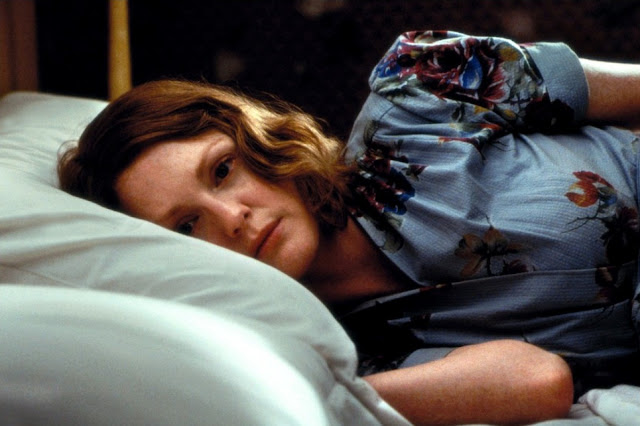 |
| Julianne Moore as Laura Brown in The Hours |
The soft-spoken Laura feels trapped by the domesticity of her suburban life. Though she loves her son, Laura (much like Virginia) does not want the life that she finds herself living. She doesn’t want to be a housewife in suburbia, a homemaker, a mother, or a caregiver. This inability to conform or to adapt to this picturesque 50’s lifestyle is encapsulated in Laura’s struggles to bake a birthday cake for her husband, Dan (she ruins the frosting, agonizes over the measurements, and literally sweats while she’s preparing it). Not realizing that Laura almost committed suicide that day and has planned to leave him and their two children, Dan says about his love for his wife and their life together, “I used to think about this girl. I used to think about bringing her to a house, to a life pretty much like this. And it was the thought of the happiness, the thought of this woman, the thought of this life, that’s what kept me going. I had an idea of our happiness.” In his simplicity, he has no comprehension of the depth of the woman he’s married and that this simple life cannot ever make her happy.
Similar to Virginia, Laura shares a lesbian kiss with her distraught neighbor, Kitty.
 |
| Laura Brown kissing her neighbor, Kitty, in The Hours |
Like Virginia’s kiss, the scene takes place in front of a small child to emphasize the inappropriateness of the act. The passion of this kiss is contrasted with the quiet despair of the rest of Laura’s life, gesturing at repressed homosexuality as the cause of Laura’s misery. Kitty pretending that the mutually enjoyed kiss didn’t happen could easily be interpreted as the catalyst for Laura’s near suicide attempt and ultimate rejection of her life, replete with her deciding that very day to abandon her family.
However, at the end of the film when Laura visits Clarissa, we find that we know little of the life from which Laura runs away other than that she works in a library and is still not happy.
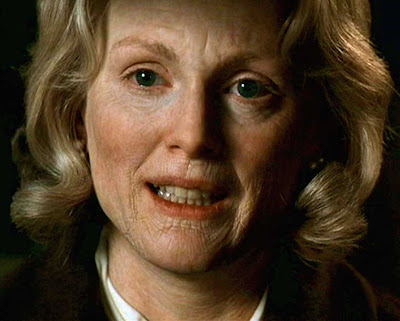 |
| Julianne Moore as an older Laura Brown in The Hours |
Laura says to Clarissa of her decision to leave her family, “What does it mean to regret when you have no choice? It’s what you can bear. There it is. No one is going to forgive me. It was death. I chose life.” There is no talk of happiness or fulfillment here, only guilt, regret, and a finding a life one “can bear.” Not only that, but she does not confess to Clarissa, a woman in a lesbian relationship, that she, too, is a lesbian or that she found peace when she found a female lover because, as far as we know, that is not the case. Laura’s youthful searching sexuality becomes just another facet of her more encompassing yearning for happiness along with her inability to embrace it.
Finally, we have Meryl Streep’s Clarissa, an intelligent woman who’s lived a full, bohemian life.
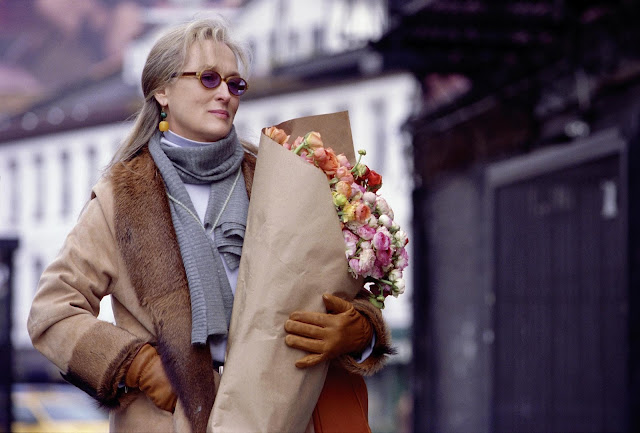 |
| Meryl Streep as Clarissa in The Hours |
Clarissa is a book editor who is financially self-sufficient, has been in a lesbian relationship for a decade, and chose to be a mother despite not having a partner at the time of her artificial insemination or her daughter’s birth. Not only that, but Clarissa plans and throws famously beautiful, wonderful parties, and yet she is still unhappy. (Incidentally, her party organizing inclinations are trivialized by the film, devaluing her community-building qualities.) Clarissa’s dilemma proves that sexuality is not the true problem; it is not the root of all three women’s female-centric unhappiness because she has been in an openly homosexual relationship for ten years. Like both Laura and Virginia, Clarissa wants that which she does not have; in her case, this is the love, affection, and approval of her dear friend and ex-lover, Richard, who is dying, presumably of AIDS. Like the other two women, she clings to an unattainable, intangible idea of happiness, specifically for Clarissa: the past.
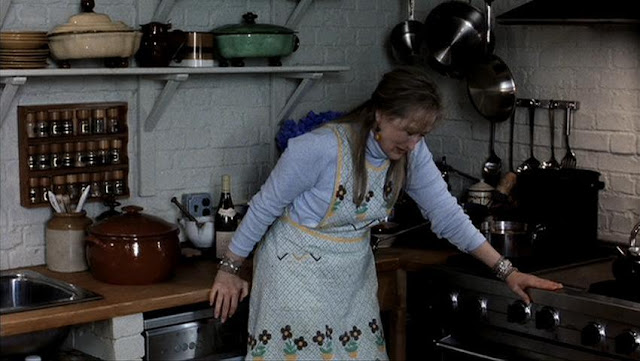 |
| Clarissa having a breakdown after visiting with Richard and deciding her life isn’t worth anything |
She says of her relationship with Richard, “When I am with him, I feel, yes, I am living, and when I am not with him, yes, everything does seem sort of…silly.” The only thing that Clarissa identifies as truly making her happy is a condescending invalid who is on the verge of death; he is a symbol of her lost youth, which she can never regain. When speaking of her job, her parties, her partner, and her entire life, Clarissa refers to them all as “false comfort.” This perspective begs the question: If her love life, social life, and professional life can’t give her fulfillment and happiness, then what will? After speaking with Laura, who is Richard’s mother, and hearing Laura’s perspective on finding a life that one can “bear,” Clarissa and Sally, her partner, embrace and kiss passionately in their bedroom. We are left with the questions: In the end, does losing Richard and meeting with his mother make Clarissa appreciate her loving partner, Sally, their home and their life together more? Or does she simply turn to Sally for comfort as she’s always done? Is her story one about settling down or just plain settling?
 |
| Clarissa and Sally kissing in The Hours |
The Hours leaves me with the distinct impression that this is a story written, told, and interpreted by a man. Though the film pays homage to the beauty and complexity of women, it gets bogged down in the mystery of their desires. The male characters (Virginia’s husband, Leonard, Laura’s husband, Dan, and even Richard and Lewis, Clarissa’s ex-lovers) are at a loss as to how to make the female characters happy, but the men are drawn to them and willing to sacrifice for the hope of that happiness. The underlying sense of female bottomlessness is ever present, as if women are always trying to fill an unfulfillable emptiness inside them (cue Freudian jokes here). This is also a function of race and class, as all three of our heroines are fairly well-educated, financially stable white women whose problems do not center around basic human needs, personal safety, traumatic events/childhoods, etc. That lack of diversity among our heroines also proves to be a limitation of the film itself because it is a limited exploration of the female experience.
Though The Hours is masterfully layered, exuding a remarkably visceral sensation of being trapped, the pervasive notion that women are unknowable not only to their lovers, but to themselves does not truly advance a feminist agenda. The lesbian kisses between Laura and Kitty and especially between Virginia and Nessie become sensationalist and borderline exploitative. The way that Clarissa pines for her male ex-lover despite having a loving female partner also undercuts the potential progressiveness of the film’s sexual politics. Is the film saying that the world is not ready to give women all the agency and happiness of which they are intellectually and emotional capable? Perhaps. Does the way the film is saying it feel like a male indictment of the incomprehensibility of women? It does to me. What do you think?
